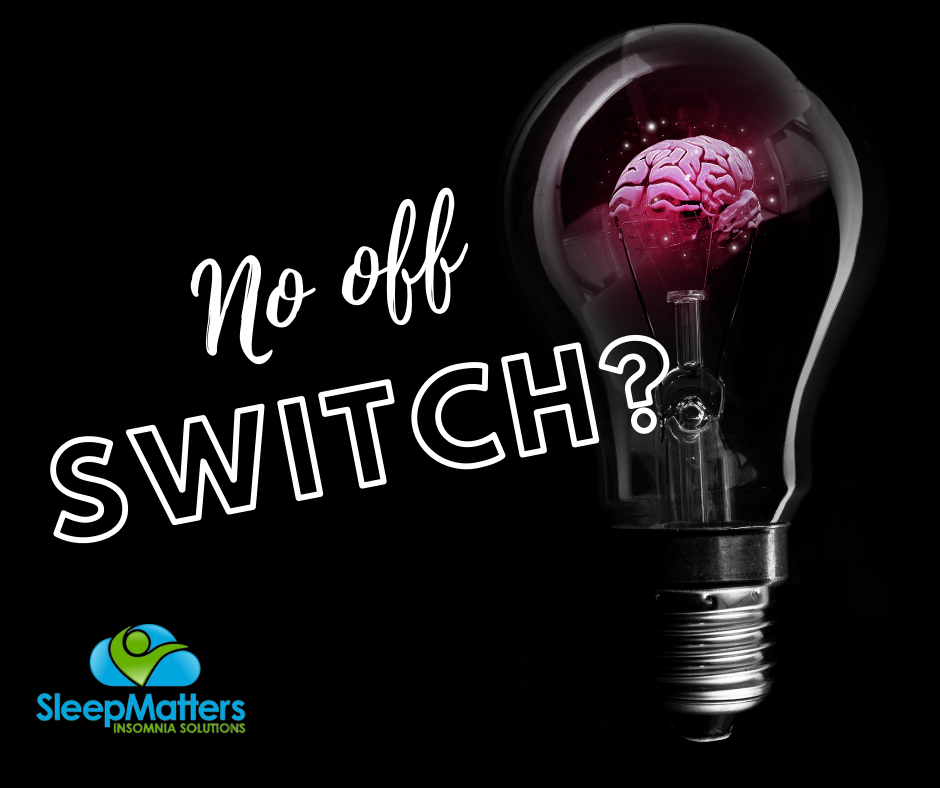
Many people who come to Sleep Matters for help with their sleep use expressions such as “I can’t switch off” to describe having a busy mind that interferes with sleep.
Many people mistakenly believe that switching off or shutting the mind down is necessary for sleep. It’s important to remember, however, that the human brain doesn’t have an off switch, and the mind is actually pretty busy whilst we sleep. Indeed, the brain is busy processing, consolidating memories, and cleaning itself during slumber.
So, while some mental activity is fine for sleep, stressed, anxious, or racing minds can certainly get in the way of falling and staying asleep and this can be a main barrier to sleeping well. Ideally, the mind should be in a reasonably calm state when we retire to bed, and we should be feeling sleepy (not just fatigued), with heavy eyes and a physical feeling that slumber is close (e.g., you may notice that you are close to nodding off on the couch before you retire to bed).
The process of winding down before bed, for most people doesn’t happen instantaneously. It usually takes some time and perhaps some effort to switch from the busyness of the day and to a state fit for slumber.
“Think of sliding into sleep as a gradual process, not an all or nothing event”.
If you find that your mind is racing, gets hooked onto random thoughts or songs, or tends towards anxious thoughts at bedtime, you might like to consider the following, science backed tips for down-regulating the mind:
- Pre-Sleep Wind Down: An important and relatively simple improvement that can be made to your sleep routine is to introduce a wind-down period before you turn out your light to go to sleep. This creates a buffer zone between daytime and night-time and helps the mind and body transition prepare for sleep. A wind down period may be between 30-60 minutes, and may need to be longer if your day has been physically, mentally, or emotionally demanding, or if you are feeling anxious or stressed.
- The pre-sleep wind down is so important that we recommend to still have a wind down period even if you are retiring to bed later than usual – for example if you have been working late or engaged in some other highly engaging activity during the evening. Staying up and extra 30 minutes to wind down may mean that it takes you less time to fall asleep.
- Be aware of which wind down activities help you to down-regulate. Examples include:
- having a bath or shower
- listening to music or a talking book
- meditation – either formal meditation by listening to a guided session on an app or CD, or informal meditation, by attending to your breath, a candle or sounds.
- reading
- craft
- TV
- gentle stretching or yoga
- chatting about your day with a fmily member or housemate
- structured relaxation exercises (e.g. slow breathing, imagining your favourite place).
- listening to sounds of nature such as rain, waves, wind, or birds can help you to focus your attention externally, on something calm rather than your attention being inward-focussed on worries, plans, or general mental busyness. See here for an interesting scientific study regarding how the brain responds to nature sounds.
- Stress management. How well are you navigating daily stressors? If stress levels are high, sleep will often be impacted as the mind and body stay aroused for longer into the evening, and may remain more alert even during sleep. Are you able to manage daytime stress any differently? For example, asking for support, confiding in a friend, planning and taking breaks, engaging in self-care, planning and problem solving, or delegating tasks. Being as proactive as you can in creating a balanced day will be beneficial for winding down and sleeping well at night.
- Reflection and emotional processing. Time out to reflect on and process the day can be also be very effective for sleep, with research finding that people with insomnia slept better following a journaling activity. Think of this activity as ‘putting the day to bed so you can go to bed’. We find that activities that promote emotional processing are especially helpful for people how tend to be emotionally avoidant during the day. That is, people who keep busy to avoid thinking too deeply, people who tend to keep their emotions under the surface. Emotional processing could be in the form of journal writing and gratitude exercises. For people who like some structure, we often suggest using Rose-Bud-Thorn as a quick exercise to get started with regular reflection. This encourages you to consider what in the day went well, what is something you are looking forward to or holds promise, and what was challenging. (https://blog.trainerswarehouse.com/thinking-methodologies-rose-bud-thorn-processing-reflection).
If you’d like support implementing strategies such as the above or would like help with other aspects of your sleep, we’d be happy to hear from you, contact the Sleep Matters team on 6107 6828.
Blog overview